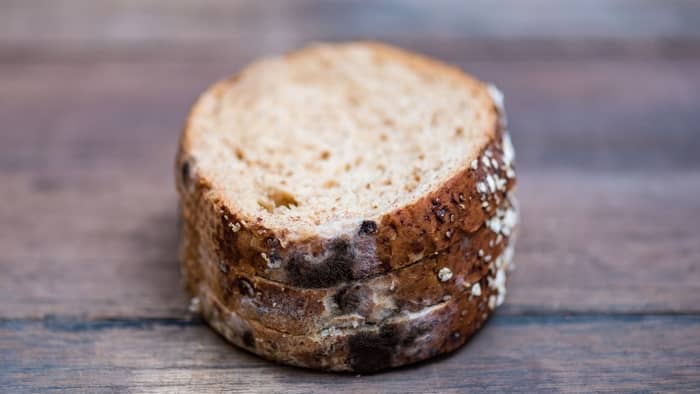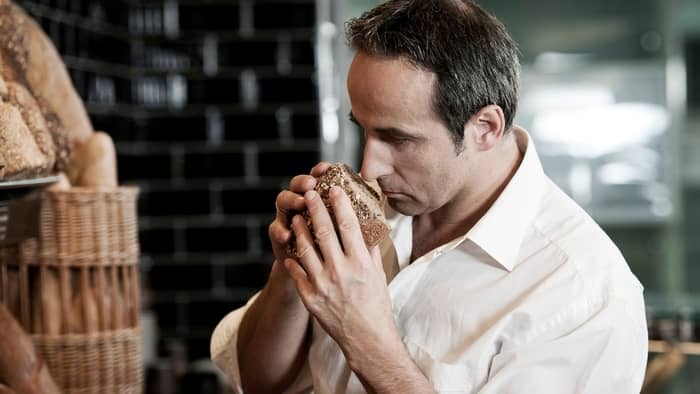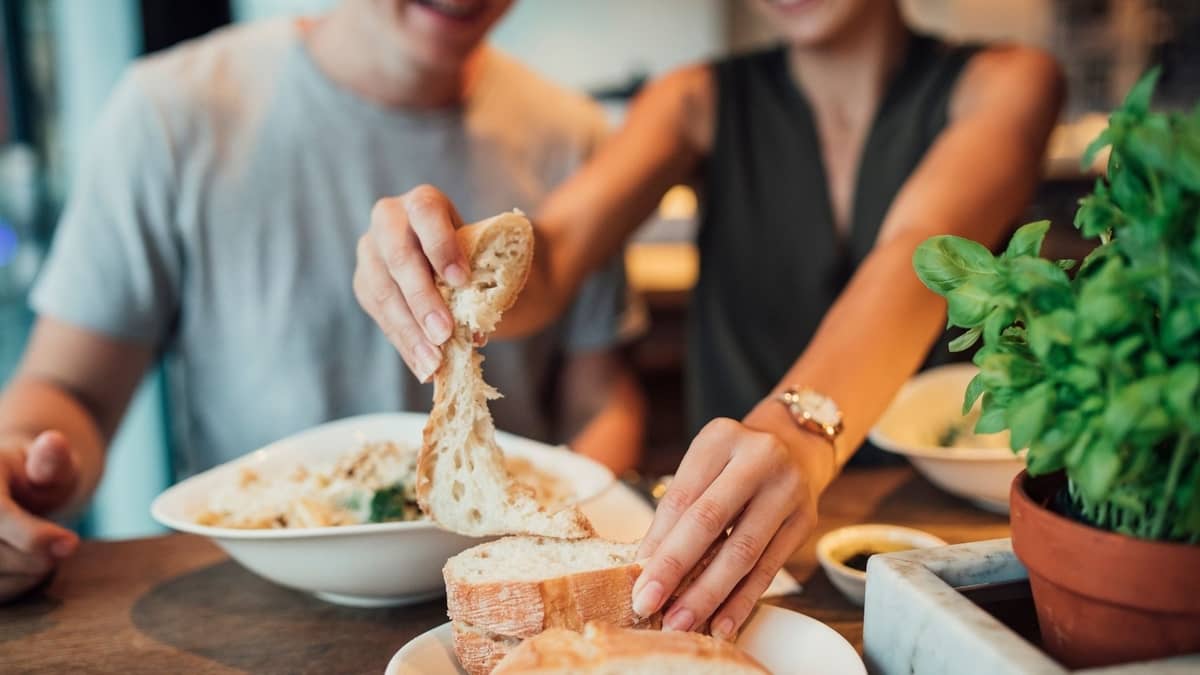Last Updated on April 12, 2022
What happens if you eat expired bread? Technically, you may eat bread one or two days after its expiration date; however, do it cautiously. You have to keep in mind that eating mold or stale bread can lead to food poisoning.
Although there are molds that are safe to eat, identifying the fungus causing the mold on your bread is tricky. Nevertheless, eating moldy bread is not advisable since it can be dangerous to your health.
Furthermore, the most common bread molds are Aspergillus, Fusarium, Penicillium, Rhizopus, and Mucor, all classified as fungi; bear in mind that toxic chemicals are mycotoxins produced by some molds that may cause irritating effects if eaten or inhaled.
Also, if molds are present in your bread, it is better to throw it out. In addition to that, get rid of all the bread in the package because mycotoxins can indeed spread. Remember that mycotoxins typically cause stomach pain and digestive problems in humans and animals.
What Happens If You Eat Expired Bread?
First off, what should I do if I ate expired bread? Once your bread passes its use-by date, the taste can alter slightly; it will typically be drier. Also, if you have artisan bread, limited preservatives are used.
Generally, when purchasing bread in the stores, it will have a “best by date” or “use by date” indicated in a small tag or at the top of the package; please note that these specific dates are only a guide and, in some instances, they may indicate the date that your bread was baked and serve as a guide about how long to keep it.
However, if your bread smells unpleasant and has a harder texture than usual, or there is mold, your bread has spoiled and is not safe to consume.
Moreover, if you ate an expired piece of bread by chance, nothing wrong will happen considering you only ate a small amount, unless the expired bread you have eaten has molded, which may cause some health issues.
In that regard, please observe if you can feel symptoms and, if you do, seek medical help immediately.
Remember, it is still safe to eat your bread five to seven days past expiration. Besides, if you still want to eat stale bread past the five to seven days mark, you can, but for those who have sensitivities, please do not consume the bread since it can undoubtedly affect the digestive system.

How to tell if bread has expired?
For the most part, how do you know if bread is bad? Essentially, we do not want to eat old bread. And if you are wondering if your bread is still good, here are some ways to know if the bread has gone bad using your eyes, nose, hands, and taste buds.
Presence of mold
In most cases, if the piece of bread you have has molded, it is best to discard all of the bread in that loaf regardless of the color; bear in mind that bread is like a sponge, and if mold spores are present in a particular area of the bread, there is a high percentage that the entire loaf is contaminated.
Odd smell
That bread needs to go when it gives an off-putting smell and does not smell like it is supposed to; remember that expired bread usually has a vinegary or beer-like smell that is not typical for any bread.
Tastes bad
When you are not sure about the smell, you can always use your sense of taste. When eating, our taste buds are best at distinguishing whether something has expired or not. If you taste an odd flavor, dispose of that bread and buy a new one.
Cuisinart Bread Maker, Up To 2lb Loaf, New Compact Automatic
Hard and dry
If you notice your bread has hardened like a rock and has become dry, your bread is no longer fresh. But, if the texture is the only problem with your bread, you can technically consume it and use it for some other recipes.
Accidentally Eating Moldy Bread
But what if you accidentally eat moldy bread? Remember, if the bread you have passes its expiration date, it will have a slight alteration in taste and will become drier. On the other hand, if you have artisan bread with limited preservatives, it will not last long at room temperature.
When we picture a piece of bread, the image that pops into our head is something light and fluffy that is perfect for making toast or sandwiches. But the issue with eating expired bread is mold.
Please note that mold can be harmless for some but may cause harm and develop digestive issues like vomiting and diarrhea. Besides, some food is safe to eat despite having molds, like blue cheese and mushrooms, but bread is not one of them.
So, if you accidentally consume moldy food like bread, you should first stay calm and not panic. The second is to be mindful that you ate moldy bread and ensure that you do not acquire any symptoms the entire day.
Luckily, if you have not felt any symptoms, you will likely be fine. However, in some cases, if the mold present in the bread you ate is dangerous, and you suddenly experience or show symptoms like shortness of breath, nausea, elevated temperature, or diarrhea, it is best to seek medical help immediately. Remember, allergic reactions to molds can either be delayed or react immediately depending on what kind of mold was present.
Bread smells bad but no mold
In essence, freshly-baked bread is gratifying and warm; but what if your bread begins to smell, but there is no mold? You probably get confused about what to do with your bread.

If your loaf of bread smells weird and has a particular smell of alcohol, beer, wine, and sometimes vinegar, it is only natural; remember that the yeast fermentation process causes all those smells. The scent can be powerful if the bread is homemade and you use beer as a leavening agent.
On the contrary, the odd smell appears when the yeast sets in the bread and converts the carbs into dioxide and alcohol. Please note that yeast powder or dry yeast has almost no scent; however, the distinct and strong beer-like smell emerges when it starts working.
Additionally, yeast is a type of single-celled microorganism from the fungus family. In addition to that, there are different yeast species that you use to make bread, create wine, and brew beer.
Because of that, when you add the yeast to the dough, it transforms sugars in the mixture producing carbon dioxide and alcohol. Besides that, it works as a raising agent. Ultimately, because of yeast, your bread rises, makes an aroma, and creates the right light and spongy texture.
FAQs
What Should I Do If I Ate Expired Bread?
The best thing you can do is observe if you can feel any symptoms. And if you do, please do not hesitate to seek medical aid as soon as possible.
How Do You Know If Bread Is Bad?
In most cases, you can tell if the bread has spoiled if you notice that it has molded. Not only that, but also the bread has an odd smell. And, of course, if it tastes different than usual.
What If You Accidentally Eat Moldy Bread?
The first thing you do is to remain calm and never panic. Second, observe if you acquire any symptoms the whole day. And if you do have symptoms, make sure to seek medical help immediately.

Zarah is an experienced pastry chef whose creations have delighted countless customers. With a passion for baking, Zarah has developed a unique style that combines classic techniques with modern flavors. Her desserts are consistently crafted with the finest ingredients, and her attention to detail is evident in the stunning and delectable results. Zarah has a wealth of experience in the pastry kitchen, and loves to share her knowledge with others. Whether it is teaching a class or creating a custom cake for a special occasion, Zarah is committed to making sure every customer is satisfied.


